Volatile oils have tons of benefits for the garden! Here’re the Best Essential Oils for Gardening and How to Use Them!
Check out the Best Essential Oils for Gardening and How to Use Them! Besides many uses in the health and beauty sector, essential oils are used in gardens to prevent harmful pests and diseases, and much more. Learn about these uses with our informative article!
Learn how to use olive oil in the garden here
Using Essential Oils in the Garden
1. Rosemary Essential Oil
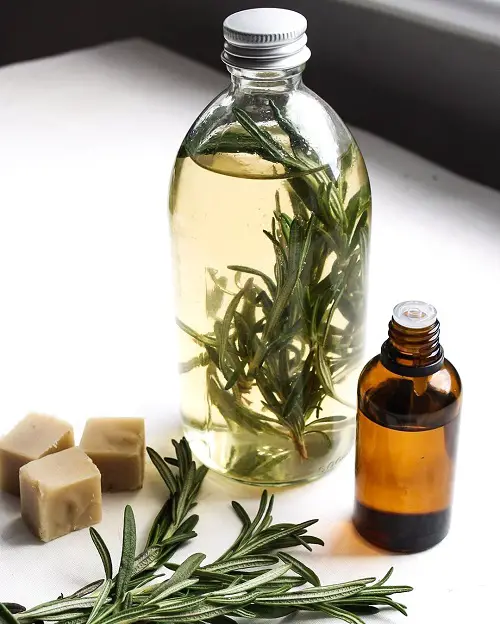
Rosemary is among the most essential oils for gardening and boasts a delightful woody scent, and serves as a powerhouse option for pest control in the garden. Its potent aroma acts as a natural repellent against a range of pests, including aphids, cabbage butterflies, flea beetles, and ants.
Moreover, rosemary essential oil works wonders as an essential oil tea for plants like cabbage, broccoli, and cauliflower, effectively protecting them from pesky insects that love to chew up foliage.
To create this botanical defense, mix a few drops of rosemary essential oil in a pot or spray bottle, and apply it around the plants to keep the bugs at bay.
It is also one of the best essential oils good for plants. Rosemary essential oil also helps in preventing fungal infections in plants. When used as an essential oil tea, it can discourage the growth of fungal pathogens, promoting healthier and disease-resistant growth.
2. Peppermint Essential Oil
With its invigorating and sweet fragrance, peppermint essential oil is a formidable essential oil spray for garden pests. This natural deterrent effectively keeps flies, aphids, spiders, cutworms, slugs, and beetles at a distance.
Additionally, peppermint essential oil proves to be an excellent solution for deterring larger pests like mice, squirrels, and moles. To harness its potency, soak a cotton ball with a few drops of peppermint oil and strategically place it in affected areas or near mole tunnels, ensuring an environment that pests will find unappealing and unpleasant. Here’s how to use essential oils for vegetable garden.
What You Need
- 8-10 drops of Peppermint Essential Oil
- 1 cotton ball
What to Do
- Place 8-10 drops of peppermint essential oil on a cotton ball.
- Position the cotton ball in areas where pests are present or likely to be active.
- Replace the cotton ball every few days or when the scent starts to fade to maintain effectiveness.
3. Melaleuca Essential Oil
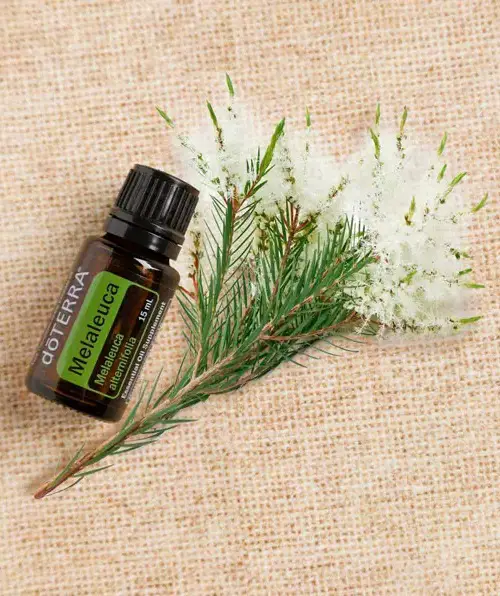
Melaleuca, another of the best essential oils for gardening, offers a potent solution for combating fungal infections that may afflict your beloved garden plants.
To create a natural anti-fungal spray, combine 1 part melaleuca essential oil with four parts water and carefully mist the plants and soil. Due to its strong properties, it is essential to apply this spray only to the plant stems, avoiding contact with leaves to prevent potential sunburn.
By harnessing the natural power of melaleuca essential oil, you can effectively protect your garden from fungal threats and foster healthier, disease-resistant plants.
Note: When using tea tree oil (Melaleuca), it is essential not to overspray, as its concentrated nature may harm the plants.
4. Lavender Essential Oil
Never leave Lavender out when talking about essential oils for garden! Lavender essential oil is a true garden gem, possessing dual benefits as a potent pest repellant and a delightful attractant for essential pollinators such as bees and butterflies.
These are cherished as the best essential oils for pest control on plants. To harness its pest-repelling prowess, place a few drops of lavender essential oil on a cotton ball and position it near the pots or vulnerable plants, creating a protective barrier against unwanted visitors.
Additionally, you can prepare a simple spray solution by mixing water with lavender oil and misting the affected areas, offering a natural yet effective way to keep pests at bay.
Furthermore, by attracting beneficial pollinators, lavender essential oil contributes to a flourishing garden ecosystem, enhancing pollination and supporting plant growth.
5. Orange Essential Oil
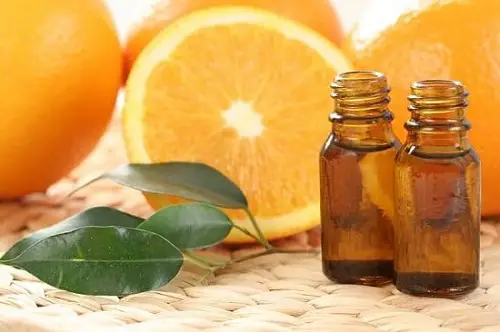
Looking for essential oils for gardening? As an additional gem for attracting pollinators, orange essential oil proves to be an excellent choice to create an inviting environment for bees and butterflies in your garden.
To optimize its pollinator-attracting potential, consider combining orange essential oil with lavender or rosemary essential oil to prepare a solution that entices these beneficial creatures to your green haven. Here are the steps.
What You Need
- 8-10 drops of Orange Essential Oil
- 8-10 drops of Lavender or Rosemary Essential Oil
- 500 ml of water
- 1 spray bottle
What to Do
- Combine 8-10 drops of orange essential oil with 8-10 drops of lavender or rosemary essential oil in a spray bottle.
- Add 500 ml of water to the spray bottle, ensuring that all ingredients are well mixed.
- Shake the spray bottle before each use to maintain a consistent blend.
- Spray the solution on pots and surrounding plants to attract pollinators and create a thriving garden ecosystem.
6. Cinnamon Essential Oil
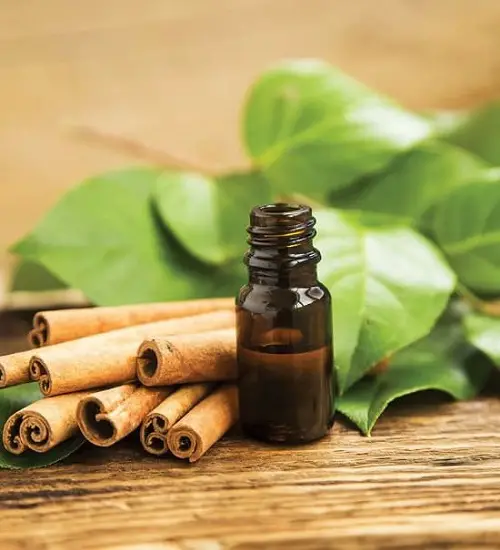
Need essential oils for pest control in garden? The invigorating aroma of cinnamon essential oil not only delights the senses but also serves as a potent deterrent against weeds and pests in the garden.
Wondering what essential oils keep gnats away? This natural solution effectively repels ants, snails, gnats, and other troublesome pests, while also contributing to the prevention of fungal infections.
To create an effective spray of one of the most essential oils for gardening, mix 10-15 drops of cinnamon essential oil with water, providing you with a powerful defense against unwanted invaders.
With cinnamon essential oil in your gardening arsenal, maintaining a pristine and pest-free garden becomes an achievable reality.
7. Basil Essential Oil
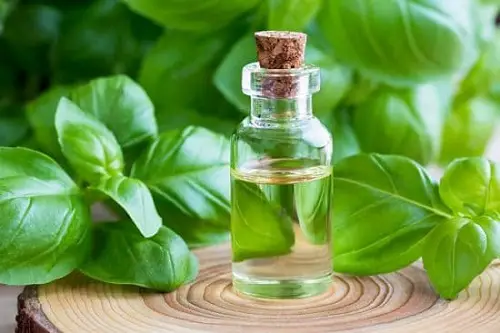
Here’s another of the best essential oils for gardening, Basil oil! Harnessing the power of basil essential oil is an effective means of deterring insects from attacking plants like beans, peppers, tomatoes, broccoli, and potatoes.
This natural insect repellant acts as a protective shield for your plants, discouraging harmful pests from causing damage. Here is how to use basil essential oil in gardening.
- Dilute basil essential oil with a carrier oil (e.g., coconut or jojoba) before applying.
- Spray the diluted oil directly on the leaves and stems of susceptible plants like beans, peppers, tomatoes, broccoli, and potatoes.
- Apply the treatment regularly, either weekly or every few days, for effective insect-repellent protection.
- Target the undersides of leaves where pests hide and maintain consistency in your garden care routine to create a thriving and pest-free environment.
By incorporating basil essential oil into your garden care routine, you can create a harmonious and thriving environment where your plants can flourish without the constant threat of pests.
8. Clove Essential Oil
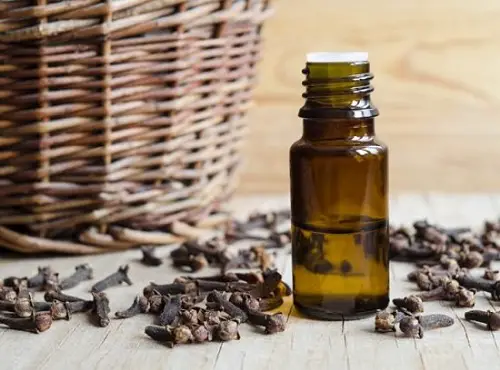
Clove essential oil stands as a versatile and all-purpose garden essential oils, effective in multiple aspects of garden care. Its potent properties aid in killing weeds, preventing mildew, fungus, and mold, and repelling insects from plants and soil. Here’s how you can use it effectively.
What You Need
- 8-10 drops of Clove Essential Oil
- 150 ml of water
- 1 squirt of Castile soap
- 1 spray bottle
What to Do
- Mix 8-10 drops of clove essential oil with 150 ml of water in a spray bottle.
- Add one squirt of Castile soap to enhance the solution’s effectiveness.
- Shake the spray bottle well to ensure proper blending of the oil and water.
- Spray the solution on weeds, infected areas, or directly on plants to prevent pest infestation, kill weeds, and tackle mildew, fungus, or mold issues.
9. Oregano Essential Oil
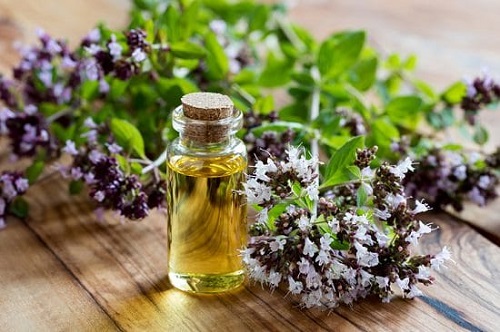
Want more essential oils for gardening? Boasting a robust and aromatic scent, oregano essential oil serves as a powerful ally for treating fungal infections in your garden.
To harness the benefits of oregano essential oil in gardening, begin by diluting the oil with a carrier oil, such as olive or almond oil, to reduce its potency. Once diluted, apply the mixture directly to the affected areas of your plants to combat fungal infections effectively. For deterring flying pests like greenflies, carrot flies, mosquitoes, and other flies, create a spray by mixing a few drops of diluted oregano essential oil with water in a spray bottle.
By using oregano essential oil as a natural remedy, you can address fungal issues and protect your garden from flying pests without the need for harsh chemicals.
10. Lemon Eucalyptus Essential Oil
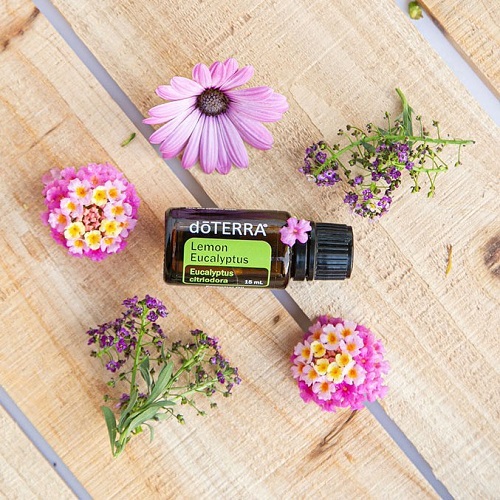
Lemon eucalyptus essential oil is among the natural essential oils for plants to chemical insect repellents, effectively keeping mosquitoes and other flying insects at bay.
To utilize its properties, mix a few drops of lemon eucalyptus essential oil with water in a spray bottle, then apply it to your skin and clothing to ward off pesky insects during your gardening endeavors.
11. Lemongrass Essential Oil
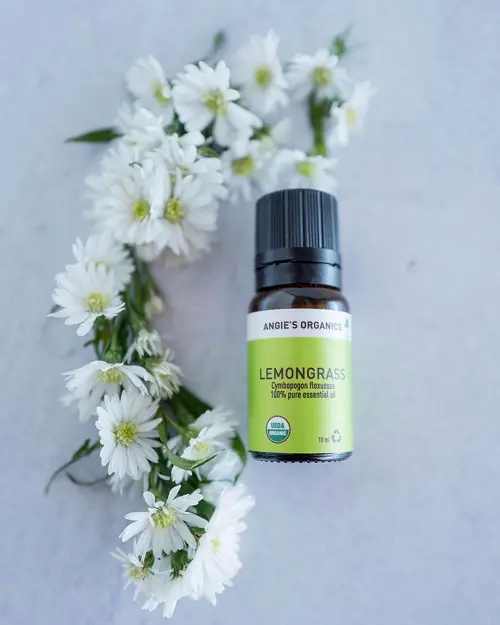
The last of the most essential oils for gardening is Lemongrass essential oil. Lemongrass essential oil acts as an effective deterrent against garden pests such as mosquitoes, ticks, and fleas. Its fresh and citrusy scent creates a pleasant environment while keeping these insects away.
Just mix a few drops of lemongrass essential oil with water in a spray bottle, then apply it to your skin and clothing before spending time in the garden.
Note: When using essential oils in your garden, exercise caution and avoid applying them in excess. Some oils, when used improperly, may cause harm to plants or skin irritation. Always research and follow proper safety guidelines before using new essential oils in your garden care routine.
Looking for natural pesticides for your garden? Click here!
How to Use Essential Oils for Gardening
1. Sprays
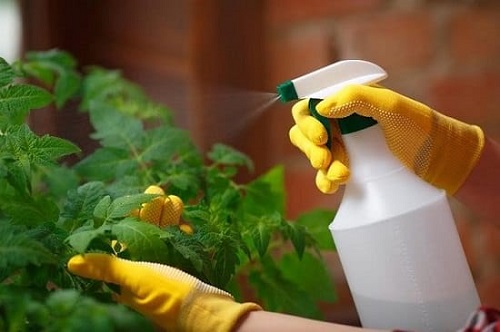
Creating essential oil sprays is an effective way to distribute the essential oils for gardening evenly across your garden, providing protection against pests and fungal infections.
For optimal results, apply the spray to plants early in the morning or evening when the cool atmosphere aids in quick absorption.
- Insect Deterrent Spray: For a potent essential oil bug spray for garden, combine 1-2 drops each of peppermint, rosemary, and thyme essential oils in a large spray bottle. Fill the bottle halfway with water and mix well. Use this solution in the early morning or evening, as it is one of the most effective essential oil insecticide for vegetable garden.
- Fungus Spray: To combat fungal infections like powdery mildew or blight, prepare a powerful fungus spray by combining one drop of oregano oil, five drops of tea tree essential oil, one squirt of Castile liquid soap, three tablespoons of baking soda, and water in a 3-liter (1-gallon) spray bottle. Spray this solution on your plants once a week in the morning or evening for ongoing protection against fungal threats.
- Essential Oil Weed Killing Spray: For a natural weed-killing solution, fill a spray bottle with distilled white vinegar (below the fill line), add one squirt of Castile soap, 15 drops of clove essential oil, and ten drops of cinnamon essential oil. Shake well to mix the ingredients thoroughly. Spray this solution directly on weeds to effectively eliminate them. Take care not to use this spray on your plants, as it can harm them.
2. Cotton Balls
Soaking cotton balls in essential oils for gardening is an effective method to prevent pests at ground level. Place these cotton balls near burrows or rodent nests to deter pests from accessing your garden. You can also use cotton balls to attract pollinators by placing them strategically around your garden.
3. Strings or Strips
Strings or strips soaked in garden essential oils can serve as an alternative to sprays. Soak cotton strips in your chosen essential oils and hang them from tree branches or near plants.
The aroma of these oils will confuse insects and repel pests, keeping your garden safe and thriving.
By incorporating these essential oils for gardening into your routine, you can create a chemical-free and beneficial environment for your plants and pollinators alike. Enjoy a thriving garden with the help of nature’s powerful essential oils!
FAQs
1. Easy Essential Oil Pesticide Recipe
Mix 10-12 drops of peppermint essential oil and 8-10 drops of rosemary essential oil with water in a spray bottle. Add a squirt of Castile soap to help the oils mix with water. Shake well and spray on plants to repel bugs and pests.
2. Essential Oils for Bugs on Plants
Peppermint and rosemary essential oils for gardening work well to keep bugs away from plants. Their strong scents act as natural repellents, protecting your garden from insect infestations.
3. Are Essential Oils Safe for Plants?
Yes, most essential oils are safe for plants when used correctly. However, it’s best to test a small area of the plant first to ensure there are no adverse reactions. Use essential oils in moderation and avoid applying them during hot, sunny hours to prevent any harm to the plants.
4. What Are the Best Essential Oils for Plant Growth?
Lavender and rosemary essential oils for gardening are known to promote plant growth. Lavender attracts pollinators like bees and butterflies, while rosemary helps deter pests, creating a healthier environment for plants to flourish.


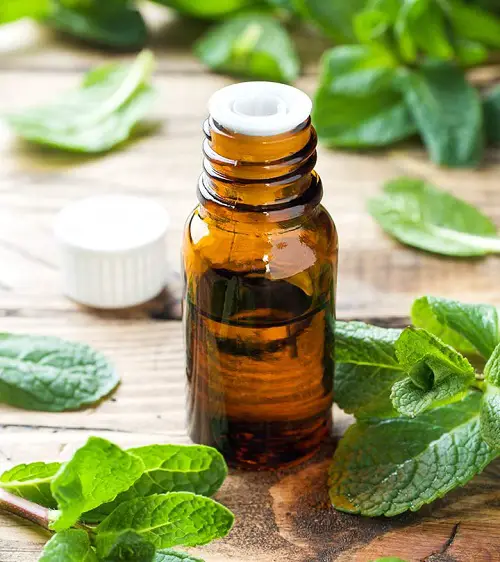
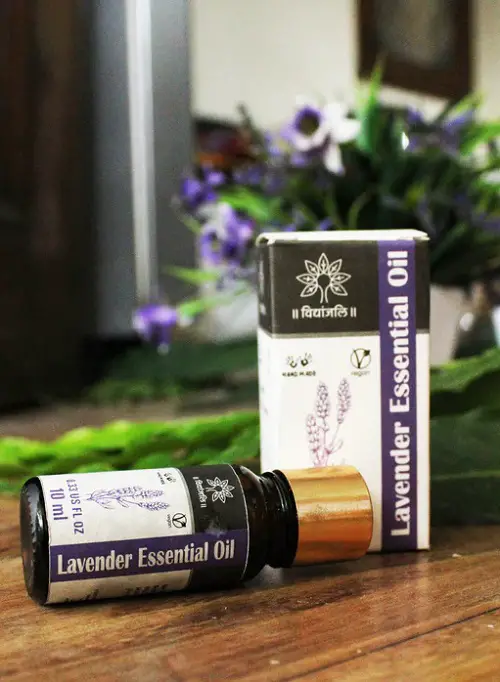

Does the brand of essential oils matter?
I think brand used for essential oil will make a difference as not all brands on the market are of the same quality.
100 percent I only use Certified Tested Pure Grade oils. fell free to connect and ill help you get the best